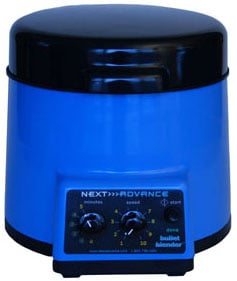Ideal for Small Organism Samples |
||
Save Time, Effort and Get Superior Results with |
||
 |
|
|
 |
| Do you spend lots of time and effort homogenizing small organism samples? The Bullet Blender® is a multi-sample homogenizer that delivers high quality and superior yields. No other homogenizer comes close to delivering the Bullet Blender’s winning combination of top-quality performance and budget-friendly affordability. | |
|
|
Bullet Blender settings for Small Organism Homogenization
Sample size |
See the Protocol |
| microcentrifuge tube model (up to 300 mg) | Small nematode samples |
| 5mL tube model (100mg – 1g) | Medium-size nematode samples |
Selected publications for Small organism homogenization
See all of our Bullet Blender publications!
2474232
small organisms, nematode
1
apa
50
date
desc
4120
https://www.nextadvance.com/wp-content/plugins/zotpress/

